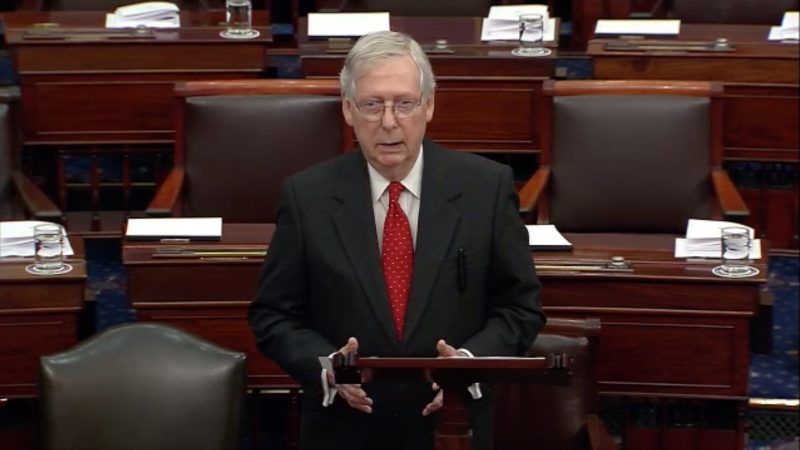The Calvinball Impeachment Trial Begins
Republicans and Democrats sparred over which rules should stay and which should go.

The first day of President Donald Trump's Senate impeachment trial on Tuesday saw Republicans and Democrats quarreling over the rules for the proceedings, with Senate Majority Leader Mitch McConnell (R–Ky.) rejecting a series of amendments proposed by Democrats that would have allowed them to call additional witnesses and collect documents blocked by the White House. While McConnell initially expressed that he would stick to the Clinton impeachment model, the proceedings are shaping up to be much like Calvinball—the game popularized by Calvin and Hobbes—where players make up the rules as they go along. Indeed, no two impeachments will be the same, it seems.
Senate Minority Leader Chuck Schumer (D–N.Y.) proposed 11 amendments to subpoena documents pertaining to Trump's interactions with Ukraine and his decision to abruptly freeze congressionally appropriated military aid to the country, which the Government Accountability Office recently labeled a crime. Schumer also sought to compel those in the president's inner circle, including acting Chief of Staff Mick Mulvaney, to testify. Trump blocked several White House officials from appearing during the House's investigation, citing executive privilege.
The Senate voted down those amendments 53-47 on party lines. A motion for additional witnesses and documents may be called after opening arguments, similar to the roadmap seen during former President Bill Clinton's impeachment trial. But in a deviation from the Clinton model, McConnell inserted an additional stipulation which will allow a majority of senators to dismiss the need to introduce any new evidence whatsoever before voting on individual witnesses or documents.
Democrats argued that Republicans were setting up the trial to conclude without evidence, making it impossible to render a fair verdict. "If the Senate fails to take this step, you won't even ask for the evidence," Rep. Zoe Lofgren (D–Calif.), an impeachment manager, said on the floor. "This trial and your verdict will be questioned."
Republicans say that if there is too little evidence, House Speaker Nancy Pelosi (D–Calif.) is to blame for not pursuing such subpoenas when the Democratic-controlled House was holding its impeachment hearings. The House voted to impeach Trump in December, charging him with abuse of power and obstruction of Congress for his role in attempting to strongarm Ukranian President Volodymyr Zelenskiy into announcing investigations that targeted Trump's political rivals.
"If I showed up in any court in this country and I said, 'Judge, my case is overwhelming, but I'm not ready to go yet. I need more evidence' … I would get thrown out in two seconds," White House counsel Pat Cipollone said on the Senate floor. "And that's exactly what should happen here."
Democrats were successful, however, in pushing for two procedural amendments. McConnell, who has urged the need for a speedy trial, originally gave each party 24 hours over two days to present their arguments, prompting criticisms from Democrats who argued that much of the trial would then occur in the middle of the night. Throughout Clinton's trial, both sides had 24 hours but no constraints on the number of days allotted. After much pushback, including from Republican Sens. Susan Collins (R–Maine) and Josh Hawley (R–Mo.), each party will now have three days.
The majority leader also initially stipulated that no House evidence would be automatically entered into the Senate record, but would require a vote to admit it. Now that evidence will only be blocked should the Senate vote to oppose it. During Clinton's proceedings, senators could not object to House evidence.
The hourslong proceedings were characterized by the same rank partisanship that has colored the entire process thus far, with testy back-and-forths that elicited a stern response from Chief Justice John Roberts. "I think it is appropriate at this point for me to admonish both the House managers and president's counsel in equal terms to remember that they are addressing the world's greatest deliberative body," Roberts said, referring to Cipollone and Rep. Jerry Nadler (D–N.Y.). "Those addressing the Senate should remember where they are."


Show Comments (120)